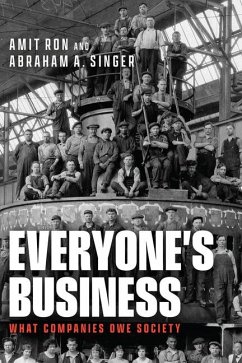"The ethics of the company in a highly politicized time. Businesses are increasingly social actors. They fund political campaigns, take stances on social issues, and wave the flags of identity groups. As a highly polarized public demands political alignment from the businesses where they spend their money, what's a company to do? Everyone's Business revises our understanding of business ethics in a world of unchecked corporate power. Political theorists Amit Ron and Abraham Singer show that the increasingly human-like role of companies in modern life is both the fundamental problem and inescapable fact of business ethics: corporate power makes business ethics necessary, and business ethics must strive to mitigate corporate power. Ron and Singer argue forcefully that the primary social responsibility of the modern business is to democracy, not politics. By wielding their newfound social influence on democratic institutions--elections, public debate, protest--businesses can be legitimated forces for good. Pragmatic and urgent, Everyone's Business offers an essential new framework for how we manufacture profit--and democracy--in our increasingly divided shared spaces"--
Hinweis: Dieser Artikel kann nur an eine deutsche Lieferadresse ausgeliefert werden.
Hinweis: Dieser Artikel kann nur an eine deutsche Lieferadresse ausgeliefert werden.








